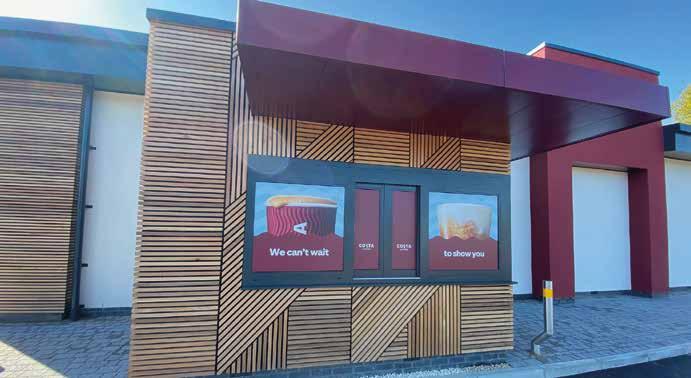
4 minute read
COMBILIFT CONTINUE ELECTRIC EXPANSION
As leading forklift manufacturer Combilift continues its 25 years in business celebrations, another new model truck, was launched in May at Ligna, the international timber and woodworking show in Hanover.
The new Combi-CB70E is a further addition to Combilift’s ever growing range of electric models which offers powerful performance, extensive battery life and unrivalled ergonomics. This model, in the vibrant Combi-green livery first seen on the recently launched Combi-CUBE product, boasts the distinction of being the shortest 7t capacity counterbalance truck on the market whilst also benefitting from multidirectional ability, enabling the versatile space saving handling of both long and bulky loads.
Design features incorporated into the highcapacity Combi-CB70E such as its large super-elastic tyres and compact wheelbase make it ideally suited for the operational demands of the timber industry. With a 7,000kg/15,500lb lift capacity, this model benefits from an impressively small footprint as well as exceptional manoeuvrability meaning that it can easily move bulky loads of timber around in confined spaces.
Combilift’s designers have gone to great lengths to ensure that the latest generation of models are kitted out with top quality components that ensure sophisticated ergonomics for a stress-free in-cab environment. Features in the spacious cab include generous glazing for excellent allround visibility, the tilting steering column, hydraulic steering and the Grammer MSG65 seat.
What sets the Combi-CB70E apart from other forklifts is its gas strut suspension cab, which uses components such as those found in large scale industrial machinery with cab suspension. Combined with the super-elastic tyres this guarantees the smoothest of rides over uneven or less than perfect ground conditions such as those typically experienced in lumber yards.
The truck also features Combilift’s internationally patented and Red Dot awarded independent electric traction which provides all front and rear drive wheels with 100% traction control. This negates the need for differential lock on slippery surfaces and significantly reduces long load momentum twisting when travelling sideways. Each electric drive incorporates parking and regenerative dynamic braking for power efficiency. Roll-out access for major electrical components also simplifies maintenance tasks.
This mix of next-gen performance, extensive battery life and exceptional ergonomics combined with all the advantages of the Combi-CB range, makes this the most powerful compact electric multidirectional forklift to date.
Combilift CEO and Co-Founder Martin McVicar said: “The increased capacities that we are offering in our electric range will answer the demand for ever more powerful products which at the same time help companies to achieve their aims for more sustainable operations. We chose Ligna as the platform for launching the CombiCB70E due to its innate suitability for customers in the timber sector, but we are confident that this model will be a popular addition to our portfolio for many other industry applications.” www.combilift.com

INTERNATIONAL TIMBER ‘BREWS UP’ COSTA COFFEE DEVELOPMENT
International Timber and Jewson have teamed up with local developer, Ascia Construction, to provide sustainable and quality cedar timber for the development of one of Costa Coffee’s latest drive-thru facilities.

Located at the Adanac Health and Innovation Campus in Southampton, the Costa Coffee drive-thru will provide at least 15 new jobs and soon begin to serve those working and visiting the hospital site. The new coffee shop will also cater to University Hospital Southampton staff using the campus’ park and ride facilities at the beginning and end of their shifts.
The building has been designed to include indoor seating for customer use, outdoor tables and a drive-thru window for customers on-the-go. The initial design incorporated red and white render, cedar cladding and grey, powder coated metal roof and windowpanes, as well as turf borders, ornamental planting and newly planted trees surrounding the site’s boundary.
When John Packer, Timber Development Manager at Jewson, was first asked to secure the cedar cladding for this project, it was discussed whether homegrown UK Cedar or Western Red Cedar would be the best fit. The cladding designs included lots of individual pieces of cedar, all the same size but cut at different angles, to create a unique timber design that has become synonymous with Costa’s coffee shops over time.
Due to the complexity of the design and to ensure the visual aesthetic of the cladding, both John and the team at Ascia Construction decided Western Red Cedar would provide the ideal solution; helping to minimise knots and to prioritise quality, durability and sustainability. “This project was one of the first major enquiries we’d worked on for Ascia Construction,” says John. “We wanted to ensure that the quality of the materials, together with the customer service provided met the company’s expectations. International Timber proved to be the perfect choice of supplier, offering a cost-competitive quote, alongside a highquality, durable product.”
International Timber’s Western Red Cedar is often a favourite for both internal and external cladding due to its natural resistance to decay and insect attack, as well as being an excellent material for thermal insulation - keeping the building cool in summer and preventing heat from escaping in winter.
Both John and the International Timber team worked closely to deliver 32 finish x 32 finish PSE cedar, providing samples which had been machined to specification and brought onto site to ensure the customer was satisfied right from the beginning. John then made two more visits throughout construction; once when the cedar was first delivered and again when it was fitted – each time with those on site at Ascia commenting on the quality of the timber.
With PEFC certification, the team at Ascia Construction could rest assured that the cedar used would be in line with Costa’s sustainability objectives. “Each time I went on-site, the guys from Ascia Construction would comment on the fantastic quality of the cedar,” adds John. “Even going as far to say it’s the best cedar they had ever worked with, which of course was music to my ears. The project was finished in April this year and it really is a superior build with quality materials and craftmanship.”









